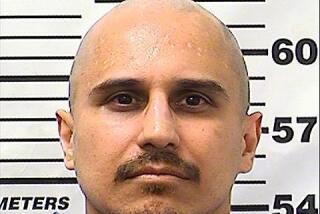Cop Killer’s Actions in Lockup Trigger Extreme Security
- Share via
Federal prisoner Hung “Henry” Thanh Mai, the convicted killer of an Orange County CHP officer, has been held in Metropolitan Detention Center in Los Angeles under some of the most extreme security in the country, a federal prosecutor said Thursday.
Because Mai has a history of violating prison rules and court orders, his cell light is on 24 hours a day, he cannot make phone calls, he is denied any writing instruments and he cannot flush his toilet.
The 28-year-old gang member admitted killing CHP Officer Don J. Burt during a routine traffic stop in Fullerton three years ago. He is being held under a level of security that matches that for convicted Unabomber Theodore Kaczynski and Timothy McVeigh, the principal Oklahoma City bomber. Fewer than a dozen federal inmates are imprisoned under such conditions, said Marc Richard Greenberg, assistant U.S. attorney.
The extraordinary measures, which were ordered by a federal judge and approved by Atty. Gen. Janet Reno, were initiated because of Mai’s record of running criminal enterprises from jail.
Investigators discovered that while Mai was in Orange County Jail, he ran an elaborate distribution ring for counterfeit securities and illegal weapons from his jail cell. In addition, he allegedly solicited an undercover Santa Ana police officer to kill a Houston man who turned him in.
Mai has been sentenced to 30 years in prison on those charges. He was convicted of the Burt murder in July and could be facing the death penalty in that case. His trial in the death penalty phase is set for March 13.
When Mai was first placed in federal custody, he was ordered not to correspond with anyone. Yet he attempted to send “kites,” a prison term for handwritten notes attached to string, to a cop killer in the Orange County Jail, Greenberg said.
“It was intercepted before it made it to its intended person,” Greenberg said, adding that corrections officers upgraded Mai’s security by putting weatherstripping beneath the cell door.
Inmates tie notes with string and whip them beneath the cell door. The note “goes out in an arc” and into the next inmate’s cell, Greenberg said.
When the transgression was brought to the court’s attention in May, restrictions were tightened further and all writing instruments were banned.
Officers then discovered that Mai had allegedly sent more notes. When officers examined his cell, they found two pencils and a pen.
“At this point, the Metropolitan Detention Center put in place measures to ensure that the judge’s orders wouldn’t be violated again, and that included the 24-hour surveillance, and that’s why the lights have to be kept on all the time,” Greenberg said.
Mai can no longer flush his own toilet because inmates have tied notes with string and flushed them down toilets to be retrieved by another inmate in an adjoining cell.
Few inmates warrant isolation as much as Mai, who is the most heavily guarded inmate at the detention center, said Greenberg.
“He’s in under these conditions because he’s proven time and time again that he is a dangerous person,” the prosecutor said.
Mai’s defense attorney could not be reached for comment.
Among the first kites sent, Greenberg said, was correspondence to one of the defendants in the 1997 shooting death of Los Angeles County Sheriff’s Deputy Shayne York. York was gunned down during a robbery attempt in a Buena Park salon in front of his fiance, a fellow deputy.
The inmate who assisted Mai by getting the note out was a member of the Mexican Mafia, Greenberg said.
When Mai is transported to and from court, he is surrounded by a team of heavily armed SWAT members.
“He’s certainly one of the most secure prisoners in the country and one of the most isolated in the nation,” Greenberg said.
More to Read
Sign up for Essential California
The most important California stories and recommendations in your inbox every morning.
You may occasionally receive promotional content from the Los Angeles Times.













